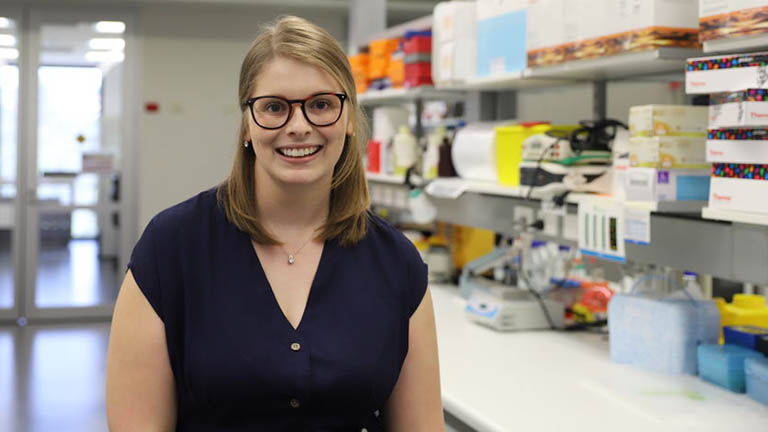
Dr Grace Burns is a HMRI and University of Newcastle researcher in the areas of Immunology and Microbiology. View Grace's research outputs on her University of Newcastle profile >
Dr Grace Burns is a postdoctoral researcher in Immunology and Microbiology, working in the Centre of Research Excellence in Digestive Health. Her current research examines the role of the immune system in gastrointestinal disease, with a focus on the contribution of small intestinal homeostatic imbalance to inappropriate responses to luminal antigens with a focus on disorders of gut-brain interactions and food allergies/intolerances.
In 2021, Grace was awarded her PhD, which focused on elucidating immune pathways that drive the onset and continuation of symptoms in functional dyspepsia (FD). The lack of knowledge surrounding the pathophysiological features and immune activation of FD has led to the diagnosis of this condition being solely reliant on self-reported symptoms and a negative endoscopic investigation. Consequently, patient management is complicated by a lack of treatable pathology or effective therapeutic options. Grace’s work in this area is focused on demonstrating that functional gastrointestinal conditions are driven by disruptions in homeostasis, activating the immune system and subsequently driving symptom onset.
Her work has identified a link between a specific alteration in the small intestinal microbiota and activation of the immune system in these patients, representing a potential diagnostic test to replace the current symptom-based diagnostic process for FD. In addition, her work aimed to characterise the immune cell populations that are altered between FD patients and a control cohort, with the aim of distinguishing specific mechanisms driving disease.
Grace was awarded a Bachelor of Medical Science (Pathology)/Bachelor of Forensic Biotechnology double degree in 2015 from Charles Sturt University, Wagga Wagga. After moving to Newcastle, she completed a Bachelor of Biomedical Science (Honours First Class) qualification in 2016 under the supervision of Prof. Simon Keely and A/Prof. Jay Horvat, investigating the development of immune responses to food proteins following antibiotic treatment.
Despite Grace’s early career stage, she has a promising upward trajectory with >30 publications, >$100k funding as lead investigator and co-supervision of 3 current PhD students. Grace has previously supervised six Honours candidates to completion, all of whom were awarded first-class Honours.
Grace demonstrates professional leadership by regularly contributing to the peer review process, having reviewed manuscripts for several top international gastroenterology journals (e.g. Lancet Gastroenterology and Hepatology, BMC Gastroenterology).
Grace regularly engages in community outreach activities, including delivering education seminars for primary care providers on the burden of gastrointestinal disorders and current approaches to management, community seminars on gut health, and information sessions for patients and their support networks on my research into gut immune activation in Parkinson’s disease. Grace also ran and presented the HMRI Poo Palace display, a community education exhibit on Digestive Health, to sellout crowds at the HMRI Open Days and the Newcastle Show.
I would like to continue my work on the immune system in functional and organic GI conditions through our partnerships in the NHMRC CRE for Digestive Health with the John Hunter Hospital Gastroenterology, Surgical and Neurology programs. The broad focus of this research will be how food and microbial antigens are associated with the immune response in such conditions.
In addition, I am interested in investigating how the immune system is impacted by the extra-intestinal consequences of functional GI disorders, such as sleep disturbances and chronic fatigue. I also hope to continue expanding on the work from my Honours year, looking at how homeostatic disturbances in the small intestine may drive development of food allergies and non-allergic food intolerances in response to antibiotic modulation of the microbiota.
I hadn’t planned to get into research, but I discovered a passion for investigating the immune system following the completion of my undergraduate degree.
I’m fascinated by how the gastrointestinal immune system and microbiota work together to protect and maintain the intestinal environment. My work is focused on identifying how this relationship is disrupted in GI disease, with the hope of identifying treatment targets to improve patient quality of life.
Gastrointestinal conditions affect a large proportion of the population and have debilitating impacts on quality of life. We know so little about how the gastrointestinal immune system and microbiota are involved in common functional gastrointestinal conditions, food allergies and food intolerances, which means treatment options for these conditions are limited, and patient symptoms are often poorly managed.
The ultimate goal for my research is to identify ways in which the microbiota and immune system interact to drive subtle inflammation and symptom onset in gastrointestinal patients. I want my work to identify new management and treatment strategies for patients with these conditions.